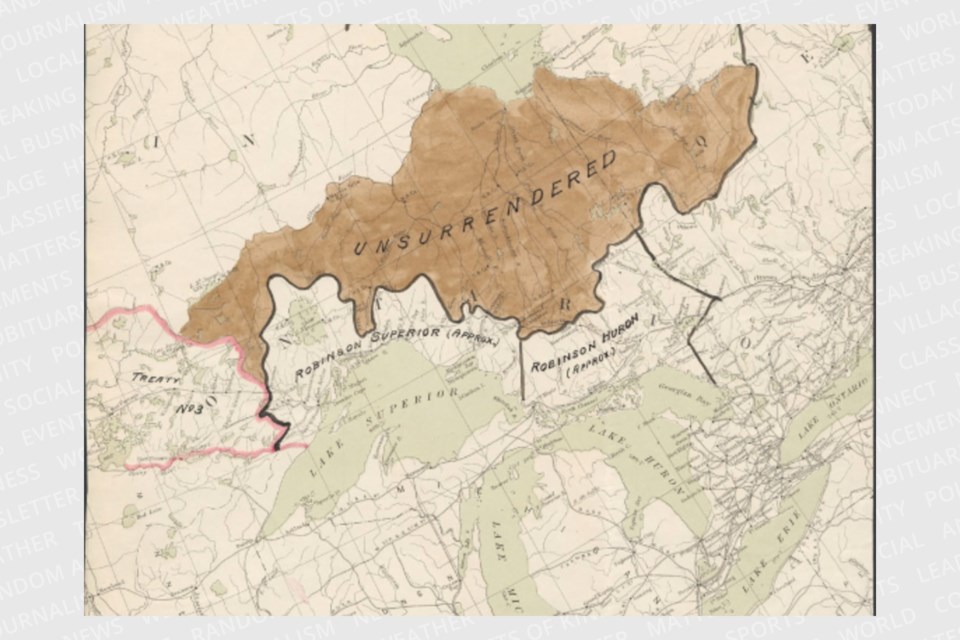The Robinson Huron Treaty Litigation Fund has received the final installment of a historic $10-billion settlement from Canada and Ontario after a lengthy court battle over unpaid treaty annuities — and now, the money will collect $1.3 million in interest for each day it sits in the legal team’s coffers while a number of proposed changes to the disbursement agreement are being discussed.
That’s just one of several new details that have emerged since some First Nations leaked confidential information to social media about a meeting between Robinson Huron Treaty (RHT) chiefs and trustees held on Manitoulin Island in late March.
According to those social media posts, the litigation fund received $5 billion from Ontario March 15, and has been accruing $600,000 in interest each day since. The remaining $5 billion in settlement dollars from Canada was deposited March 25.
The total amount of interest earned on the $10-billion settlement will be divided among all 21 First Nations under the treaty, which saw the Anishinabek of Lake Huron cede much of northeastern Ontario to the Crown when it was signed in present-day Sault Ste. Marie in 1850.
The historic settlement provides past compensation to Robinson Huron Treaty beneficiaries after not seeing an increase to annual treaty payments for a period of nearly 150 years, as wealth generated in the territory through resource revenues from the mining, forestry and fishing sectors continued to grow.
The annual treaty payments to Anishinaabe beneficiaries, also known as annuities, have remained at $4 per person since 1875. Prior to that, the annuities were equivalent to $1.60 per person.
The Robinson Huron Treaty Litigation Fund (RHTLF) filed a statement of claim in court surrounding compensation for past treaty annuities in 2012, with stage one of the trial beginning five years later.
In 2018, the Ontario Superior Court of Justice ruled the Crown had an obligation under the 1850 treaty to increase annuities as wealth generated from the land grew over time, so long as the Crown can do so without incurring a loss.
A $10-billion settlement was announced in 2023, despite Ontario continuing its appeal of previous court decisions during the annuities claim. Increases to future annuity payments, meanwhile, have yet to be determined.
Years before the battle for compensation over past annuities entered the courtroom, RHT chiefs and trustees had already devised a collective disbursement agreement: Priority Payment 1 concerns legal fees and other costs, plus a 25-per-cent return on original investments by each nation when the litigation fund was created.
After that, the remaining proceeds were to be split 50-50 into two more priority payments: Priority 2 would see 39 per cent of the claim proceeds distributed equally among the First Nations that participated in the trust, with one per cent going to living individual annuitants who are not members of a Lake Huron First Nation. The remaining 10 per cent would then go to fund a ‘war chest’ that would be used for the collective purposes of advancing rights and interests of the First Nations who participated in the trust.
Priority 3 is divided into two, with half going to First Nations who participated in the trust proportional to the respective population, which would be subject to a verification process. The other half would then go to First Nations who participated in the trust proportional to the number of annuitants within their respective populations.
During the confidential meeting in late March, the Robinson Huron Treaty Litigation Fund reportedly proposed a number of amendments to the compensation disbursement agreement that it believes will speed up the transfer of funds to First Nations, including:
- A reduction of the 10 per cent ‘war chest’ being held for collective purposes to five per cent under Priority Payment 2
- Addition of the five per cent taken from the war chest to the 50 per cent that will be divided by Indigenous Services Canada (ISC) population figures and registered annuitants of RHT First Nations under Priority Payment 3
- Elimination of the verification process for registered annuitants, resulting in sole use of ISC population figures to determine population payouts to RHT First Nations under Priority Payment 3
If approved, it’s believed the proposed changes would result in more funds being distributed to RHT First Nations sooner than the two-to-three year window that was originally planned. All 21 First Nations must agree to the proposed amendments to the collective disbursement agreement and produce band council resolutions stating their support for those changes.
While those changes are being decided upon, RHTLF will prepare to pay out funds in accordance with Priority 1 of the disbursement agreement. No timeline has been provided for the payout.
The litigation fund would not confirm or deny any of the details leaked from its confidential meeting when reached by SooToday Wednesday. It issued a statement via email instead, advising First Nations to refrain from posting confidential information publicly.
“RHTLF works directly with First Nations’ leadership who are self-determining and have the prerogative to share financial information with members. However, we want to highlight that publicly sharing details regarding the transfer of large sums of money poses significant threats to the RHTLF from organized criminal enterprises and other cyber crime,” said the litigation fund. “In addition, sharing any financial information publicly on public platforms puts our most vulnerable community members at the risk of scammers.
“The more information that scammers have, the more opportunities they have to build credibility, so we would caution all beneficiaries and First Nations to secure this information and not share it publicly.”



